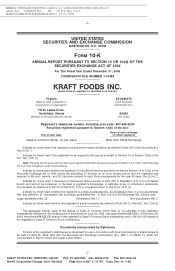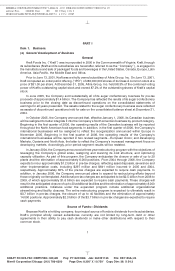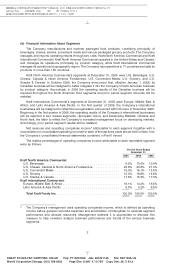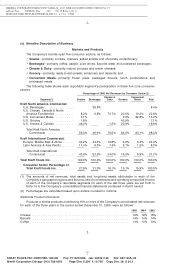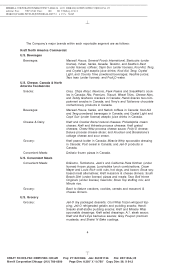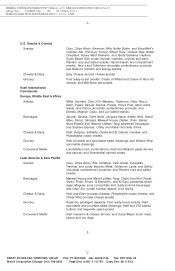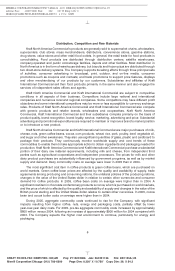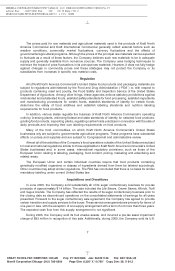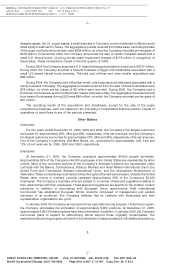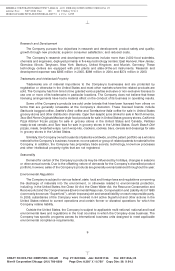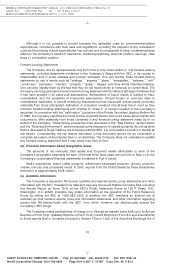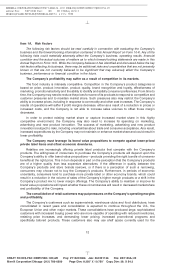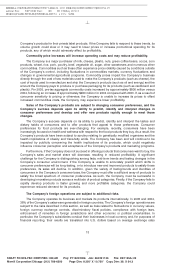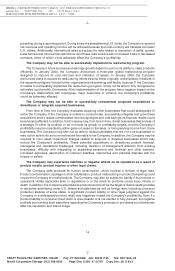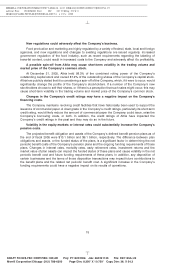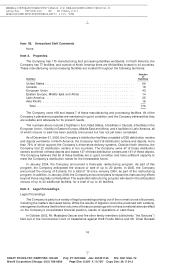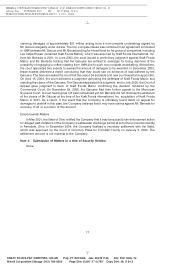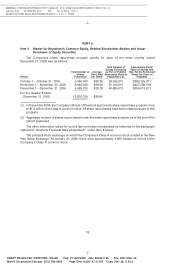Kraft 2005 Annual Report Download - page 9
Download and view the complete annual report
Please find page 9 of the 2005 Kraft annual report below. You can navigate through the pages in the report by either clicking on the pages listed below, or by using the keyword search tool below to find specific information within the annual report.
MERRILL CORPORATION MBLOUNT// 9-MAR-06 14:03 DISK126:[06CHI5.06CHI1135]DE1135A.;25
mrll.fmt Free: 110D*/540D Foot: 0D/ 0D VJ RSeq: 8 Clr: 0
DISK024:[PAGER.PSTYLES]UNIVERSAL.BST;51
KRAFT FOODS-FSC CERTIFIED-10K/AR Proj: P1102CHI06 Job: 06CHI1135 File: DE1135A.;25
Merrill Corporation/Chicago (312) 786-6300 Page Dim: 8.250 X 10.750Copy Dim: 38. X 54.3
desserts assets, its U.S. yogurt assets, a small business in Colombia, a minor trademark in Mexico and a
small equity investment in Turkey. The aggregate proceeds received from these sales, excluding the sale
of the sugar confectionery business, were $238 million, on which the Company recorded pre-tax gains of
$108 million. In December 2005, the Company announced the sale of certain Canadian assets and a
small U.S. biscuit brand, incurring pre-tax asset impairment charges of $176 million in recognition of
these sales. These transactions closed in the first quarter of 2006.
During 2004, the Company acquired a U.S.-based beverage business for a total cost of $137 million.
During 2003, the Company acquired a biscuits business in Egypt and trademarks associated with a
small U.S.-based natural foods business. The total cost of these and other smaller acquisitions was
$98 million.
During 2004, the Company sold a Brazilian snack nuts business and trademarks associated with a
candy business in Norway. The aggregate proceeds received from the sale of these businesses were
$18 million, on which pre-tax losses of $3 million were recorded. During 2003, the Company sold a
European rice business and a branded fresh cheese business in Italy. The aggregate proceeds received
from sales of businesses during 2003 were $96 million, on which the Company recorded pre-tax gains of
$31 million.
The operating results of the acquisitions and divestitures, except for the sale of the sugar
confectionery business, were not material to the Company’s consolidated financial position, results of
operations or cash flows in any of the periods presented.
Other Matters
Customers
For the years ended December 31, 2005, 2004 and 2003, the Company’s five largest customers
accounted for approximately 26%, 28% and 28%, respectively, of its net revenues, and the Company’s
ten largest customers accounted for approximately 37%, 38% and 38%, respectively, of its net revenues.
One of the Company’s customers, Wal-Mart Stores, Inc., accounted for approximately 14%, 14% and
12% of net revenues for 2005, 2004 and 2003, respectively.
Employees
At December 31, 2005, the Company employed approximately 94,000 people worldwide.
Approximately 30% of the Company’s 44,000 employees in the United States are represented by labor
unions. Most of the unionized workers at the Company’s domestic locations are represented under
contracts with the Bakery, Confectionery, Tobacco Workers and Grain Millers International Union; the
United Food and Commercial Workers International Union; and the International Brotherhood of
Teamsters. These contracts expire at various times throughout the next several years. Outside the United
States, labor unions or workers’ councils represent approximately 55% of the Company’s 50,000
employees. The Company’s business units are subject to a number of laws and regulations relating to
their relationships with their employees. These laws and regulations are specific to the location of each
enterprise. In addition, in accordance with European Union requirements, Kraft International
Commercial has established European Works Councils composed of management and elected
members of its workforce. The Company believes that its relations with employees and their
representative organizations are good.
In January 2004, the Company announced a three-year restructuring program. Under this program,
the Company anticipates the elimination of approximately 6,000 positions. At December 31, 2005,
approximately 4,900 of these positions have been eliminated. In addition, in January 2006, the Company
announced plans to expand its restructuring efforts beyond those originally contemplated. The
expanded restructuring program will result in the elimination of approximately 8,000 additional positions.
8
6 C Cs: 60409

